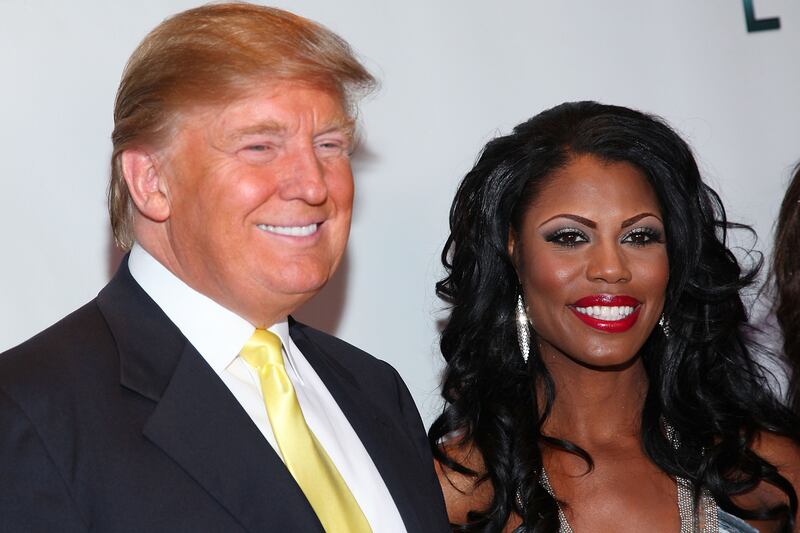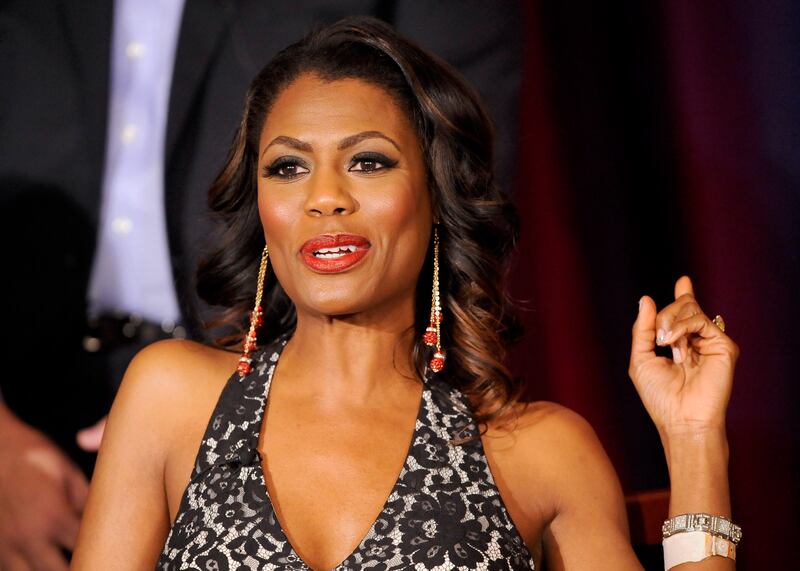After the success of Donald Trump’s reality television show The Apprentice, he was looking for a way to up the ante.
At one point, he toyed with developing a version of the show that pitted black contestants vs. white contestants—something that never saw the light of the day, and for good reason. But by 2010, Trump had seemingly cracked the code with The Ultimate Merger, a Frankenstein’s monster of The Apprentice and The Bachelorette that pitted rich men against poor men for the affection of Omarosa Onee Manigault.
Omarosa, who is currently the Trump campaign’s director of African-American outreach, had first come into Trump’s life as reality television’s prime-time villain on the first season of The Apprentice in 2004. Six years later, Trump, her self-described mentor, wanted to help her find a soulmate who could handle her… unique personality.
“I don’t know if there is a right guy,” Trump said in a NBC News interview promoting his now forgotten show. “I don’t think there’s any man in the world that can handle this.”
“Oh-oh,” Omarosa, next to him, playfully resisted.
“She’s tough,” Trump continued. “She’s smart, she’s tough, but she’s good. You know, she’s got a good heart. I will say that.”
But this wasn’t just any Bachelorette rip-off. This one had a twist: Six of the men were rich and six of the men were poor. And only Trump knew who was who.
Throughout the season, Omarosa would consult with Trump about the various men, seeking guidance as to who could possibly be her best suitor.
“He calls it like sharks mating. But he loves it, though,” Omarosa explained to NBC.
The 12 men of opposite income brackets would fly out to Trump International Hotel in Las Vegas and be filmed for a four-week span as they tried to prove themselves adequate paramours for Omarosa.
The contestants, at least on the first of two seasons, would sign a prenuptial agreement that Omarosa would rip up as each person got eliminated. (Trump reportedly had all his wives sign pre-nups and frequently recommends that others do so as well.)
“We believe that love is serious business. We don’t go in with roses and poetry,” the show’s star said.
According to a contestant application for the show obtained by The Daily Beast, prospective lovers would have to answer a series of questions, including a section about annual earnings, to allow Trump to select from opposite sides of the spectrum.

There are a host of other ordinary requests for information, including prompts to “Describe your perfect date” and “How would your best friends describe you?” and most importantly “What do you think of Donald Trump?”
Of course for Trump, notorious for having each and every person even tangentially related to him sign a nondisclosure agreement, that is not the last thing potential contestants would have to agree to.
“If you are selected as a potential participant, you must execute more formal applications, questionnaires, waivers and release agreements, including, but not limited to an applicant agreement, releases, waivers and arbitration agreement and other agreement(s) as required by the Producer or the Network, or any of their licensees, successors or assigns,” one of the paragraphs on the 21-page application reads.
The contestants would also have to submit to physical and psychological examinations, and agree to pay a lofty fine should they violate stipulations of the confidentiality agreements. It’s unclear if they also had to agree to appear nude, like contestants on The Apprentice.
“I agree to pay Producer and the Network the sum of Five Hundred Thousand Dollars ($500,000.00) per breach plus disgorgement of any income that I may receive in connection with my breach as liquidated damages in the event I breach any of the confidentiality provisions of this Application and Agreement prior to the initial exhibition of the final episode of the Program.”
That exorbitant price might be easier for some of the contestants than others.
Leading up to the show, Trump seemingly acknowledged that Omarosa was an unlikable figure, telling NBC in the same promotional interview that he “hated her from the beginning” of The Apprentice.
“But I also loved her. And the show went to No. 1 on many weeks, as you know. Was a big monster success and continues to be a big monster success,” Trump said. “And she really was a part of it. I mean, she did something very special for The Apprentice. And to this day it continues to be so good. And I really give her a lot of credit.”
The whole project was dreamed up by Trump himself and Andy Litinsky, a former contestant on The Apprentice who went on to run Trump Productions LLC and become a syndicated radio host. It aired on TV One, a network primarily devoted to African-American audiences, and was billed as the next chapter in Trump’s successful television career.
That didn’t exactly pan out.
In the promo for the first season, Omarosa—dressed in Cruella de Vil red—walks into Trump’s office in Trump Tower.

“You’ve been very good for me,” Trump says, shaking her hand (something that he is often not inclined to do). “And you’re my pal. But you know, I’d love to have you meet some guy. Is there anybody that can tame you?”
He presents her with a cream-colored briefcase of his findings, a dozen men from various backgrounds and socio-economic levels, and sends her off to find love in Trump’s golden hotel in Vegas.
There are tears. There are physical challenges. And at one point, Omarosa is called a “black stallion” by a man massaging her.
In one scene, Omarosa is filmed on the phone with Trump, weighing her options prior to an in-person meeting where he asks, “Do you know who you like of the group?”
All the contestants’ names are then introduced as Mary J. Blige’s “Real Love” plays with each man’s name cascading onscreen in token Trump gold colors.
The lead-up to the show did not portend great success for the short-lived program. Robert Horowitz, one of the program’s executive producers, laughably tried to market Omarosa as the hero of the production instead of her known reputation as television’s biggest villain.
“You will like Omarosa; you may not want her for your son or brother, but you will easily see where she has a lot of positives in her life,” he told Variety at the time.
Howard Stern, the gangly shock jock who was good friends with Trump during the early 2000s, also gave the show some air time, asking some stereotypically probing questions.
“Did you squeeze their penis during the taping of the show or did Trump check to see how big they were?” Stern asked, prompting his guest to laugh out of embarrassment.
“Don’t talk about my mentor,” Omarosa responded, deflecting the question.
By the end of the four-week filming process, 11 contestants were whittled down in the weekly “Meditation Room” where Omarosa would send the losers home, until only one man remained: R&B singer Ray Lavender, scribe of the popular hit “My Girl Gotta Girlfriend.”
Lavender was legally separated at the time—i.e., still married—so his courtship with Omarosa didn’t last long either, and she was left at the end of the season with no one by her side. (Al B. Sure!, who had previously dated Omarosa and reportedly had his 21st birthday on one of Trump’s yachts, was eliminated in Episode 8.)
The star of the show, who did not respond to a request for comment from The Daily Beast, went on to date actor Michael Clarke Duncan, who tragically died of a heart attack in 2012. And as for the golden-fleeced standard bearer of the Republican Party, one season was not enough.
“The Ultimate Merger has been a huge success,” Trump said in 2011, announcing that Toccara Jones, formerly of America’s Next Top Model, would be starring as the new bachelorette. “Season 2 is going to be much bigger. I know great TV, and Toccara will make great TV.”
But after that year, the show was discontinued and almost disappeared without a trace, with little to no mention of it ever again by Trump, who often brags about the success of his business ventures. It did not make the top 156 shows listed on Nielsen’s ratings that year, and he went back to The Apprentice before launching his insurgent presidential run. There are no full episodes readily available online, a number of contestants did not respond to queries, and the show is not even listed on his Wikipedia page.
Over five years after it disappeared from the airwaves, Trump’s campaign did not respond to a request for comment about the quality of his matchmaking abilities.





